SAN DIEGO — A move to toughen penalties on crimes like shoplifting appears to be heading to the ballot box this November.
More than 900,000 signatures have been collected for a new statewide initiative to amend Proposition 47.
Prop 47, passed back in 2014, reclassified certain low-level drug and theft offenses to misdemeanors.
Nearly 60 percent of California voters passed Prop 47. Now a decade later, it appears it will be once again up to the state's voters to decide whether to roll back this measure, which many local lawmakers say has had unintended consequences.
"It has really made what should be illegal, legal," said San Diego County District Attorney Summer Stephan.
Under Prop 47, low-level crimes like shoplifting, as well as certain drug offenses, were reclassified from felonies to misdemeanors.
The money saved by having fewer people in state prisons was then re-invested into treatment programs and victim services.
Critics of Prop 47, though, including San Diego Mayor Todd Gloria, claim that it has led to an explosion of retail theft..
"When crimes are committed, there must be consequences," Gloria said at his State of the City address earlier this year.
Gloria said that criminals have exploited Prop 47's reforms, ransacking stores and turning retail theft into a '"cottage industry," forcing stores to respond by locking up their products.
"We should be locking up criminals, not laundry detergent!" Gloria said earlier this year. "We should be punishing thieves, not customers. We will not accept this as the new normal."
This new proposed ballot measure to repeal Prop 47, known as the "Homelessness, Drug Addiction and Theft Reduction Act," would stiffen penalties for repeat retail thieves, as well as those possessing hard drugs like fentanyl.
While there would be a two-strike grace period, the third conviction would be treated as a felony, even if the theft is worth less than $950.
In drug-related crimes, those convicted a third time would have an option to seek treatment or go to prison.
"We can do this," District Attorney Summer Stephan said earlier this year, "and San Diego can lead the way."
When passed in 2014, Prop 47 promised to alleviate prison overcrowding and reduce recidivism rates.
"Proposition 47 has made good on every promise that it made to voters when it was on the ballot in 2014," said Will Matthews, a spokesperson for Californians for Safety and Justice, which helped to write Proposition 47.
"There is not a single study out there that shows that Proposition 47 has had a negative impact on crime rates," he told CBS 8.
Matthews said that Prop 47 has saved the state over $800 million in the past ten years by decreasing the prison population: money that's been re-invested into safer communities.
"If we go back to the days where we are just over-utilizing our state prisons, the savings realized by Proposition 47 will go away, the investment at the community level in crime prevention, in healing services for victims, will go away," he added.
To qualify for the November, the collected signatures must first be verified. While more than 900,000 signatures were gathered, only 546,651 valid signatures are required to qualify.
WATCH RELATED: Multiple mayors push for initiative to close Prop. 47 'loopholes'

